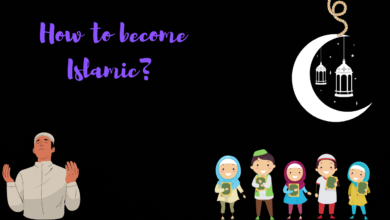
Why study Islam?
Studying Islam can provide you with a deeper understanding of one of the world’s major religions, its beliefs, practices, and historical context. This knowledge can foster intercultural understanding, promote religious literacy, and help you engage in informed discussions about global events and social issues.

Introduction
In a world characterized by diversity and interconnectedness, the study of various cultures, religions, and belief systems becomes paramount. One such religion that has significantly impacted history, culture, and global affairs is Islam. The study of Islam transcends its religious boundaries, providing insights into its profound impact on societies, art, science, philosophy, and politics. This article delves into the reasons why studying Islam is not only important for followers of the faith but also for anyone seeking a broader understanding of the world.
Understanding a Global Faith:
Islam is one of the world’s major religions, with over 1.9 billion followers globally. By studying Islam, individuals can gain insights into the beliefs, practices, and values that shape the lives of millions. A comprehensive understanding of Islam allows for more meaningful cross-cultural interactions and promotes mutual respect among diverse populations.
Historical Significance:
The history of Islam spans over 1,400 years and has left an indelible mark on human civilization. From the rise of the Islamic Empire to the Golden Age of Islam, which saw advancements in science, mathematics, medicine, and philosophy, the study of Islam offers a window into the historical achievements and contributions of Muslim societies.
Cultural Enrichment:
Islam has played a pivotal role in shaping the cultures of regions ranging from the Middle East to Africa, Asia, and even parts of Europe. The study of Islamic art, architecture, literature, music, and culinary traditions provides a deep appreciation for the diversity and creativity of human expression.

Exploring Philosophy and Thought:
Islamic philosophy has produced renowned thinkers such as Ibn Sina (Avicenna) and Al-Farabi, who have made significant contributions to metaphysics, ethics, and political theory. Studying Islamic philosophy opens avenues to explore questions about existence, morality, and the nature of reality.
Bridging East and West:
Islam’s geographic and cultural reach makes it a unique bridge between the Eastern and Western worlds. By studying Islam, individuals can foster a more comprehensive understanding of the connections and interactions between these two spheres, thereby enriching their understanding of global history and intercultural dynamics.
Contemporary Relevance:
In the modern world, Islam remains a powerful force shaping political, social, and economic dynamics in various regions. Understanding Islamic beliefs and practices helps individuals make sense of current events, global conflicts, and international relations. It also aids in countering stereotypes and biases that may arise from ignorance.
Also check
- Who was the last Prophet of Islam?
- Why was the Hijra a turning point for Islam?
- Should I continue fasting if I get my period Islam?
- When did Turkey turn to Islam?
- why is islam so strict?
Religious Pluralism and Tolerance:
Studying Islam contributes to fostering religious pluralism and tolerance. In an era marked by religious misunderstandings and conflicts, education about Islam can promote a more inclusive and harmonious society by dispelling myths and encouraging open dialogue.
Personal Growth:
The study of any religion, including Islam, offers opportunities for personal growth and reflection. Exploring the spiritual and ethical dimensions of Islam can lead individuals to contemplate their own beliefs and values, encouraging a deeper understanding of themselves and their place in the world.
In conclusion, the study of Islam transcends religious, cultural, and geographical boundaries, offering a wealth of knowledge that enriches our understanding of the world. From its historical significance and cultural contributions to its contemporary relevance and philosophical insights, Islam’s multifaceted nature invites learners to embark on a journey of discovery and enlightenment. By studying Islam, we contribute to a more informed, empathetic, and interconnected global community.
FAQs About Studying Islam
Why should I study Islam?
Studying Islam can provide you with a deeper understanding of one of the world’s major religions, its beliefs, practices, and historical context. This knowledge can foster intercultural understanding, promote religious literacy, and help you engage in informed discussions about global events and social issues.
What are the benefits of learning about Islam?
Learning about Islam can broaden your perspective on cultural diversity, enhance your ability to critically analyze information, and promote tolerance and respect for people of different faiths. It can also be personally enriching, offering insights into ethical and moral principles that can guide your own life.
Do I need to be a Muslim to study Islam?
No, you do not need to be a Muslim to study Islam. Just as one can study other religions or cultural subjects without belonging to them, studying Islam as an academic or cultural pursuit is open to anyone interested in understanding the religion’s history, beliefs, and impact on society.
Is studying Islam only for religious purposes?
Studying Islam serves both religious and non-religious purposes. While it can deepen the faith of Muslim individuals, it can also offer valuable insights into the religion’s historical, cultural, and geopolitical significance for those studying it from an academic or comparative religion perspective.
What can I learn from studying the history of Islam?
Studying the history of Islam provides insights into the development of societies, the spread of ideas, and the interactions between different cultures. You can learn about key historical events, influential figures, and how Islamic civilizations have contributed to fields like science, art, and philosophy.
How can studying Islam enhance my cultural awareness?
Studying Islam can help you understand the cultural practices, traditions, and values of diverse Muslim communities around the world. This knowledge fosters empathy, reduces stereotypes, and promotes respectful cross-cultural interactions.
Are there career opportunities related to Islamic studies?
Yes, there are various career opportunities related to Islamic studies. These include roles in academia, research institutions, international relations, journalism, diplomacy, cultural organizations, and non-governmental organizations focused on human rights and interfaith dialogue.
Is studying Islam relevant to current global affairs?
Absolutely. Understanding Islam is crucial for comprehending many contemporary global issues, such as terrorism, international relations, human rights, and cultural conflicts. Informed perspectives on these matters require a nuanced understanding of Islam’s role and impact.
Can studying Islam help combat stereotypes and misinformation?
Yes, studying Islam can contribute to dispelling stereotypes and misinformation. By learning about the religion from credible sources, you can better discern accurate information from biased narratives, which in turn helps promote a more accurate and respectful portrayal of Islam and Muslims.
How can I start studying Islam if I have no prior knowledge?
Starting to study Islam can be as simple as reading introductory books, taking online courses, attending lectures, or visiting cultural centers and mosques. Engaging with diverse resources and seeking guidance from scholars or experts can provide you with a solid foundation for your studies.






